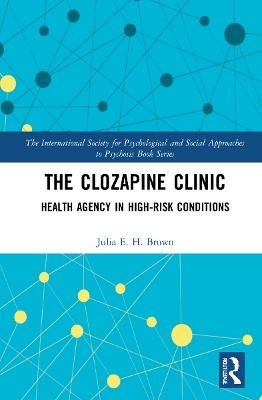
The Clozapine Clinic
Routledge (Verlag)
978-0-367-86272-5 (ISBN)
This book is the first ethnography of the little-known world of clozapine clinics in Australia and the United Kingdom. Anthropologist Julia Brown engages with the narratives of people living in extreme health circumstances to challenge some of the assumptions made about clozapine treatment and to explore what it means to be diagnosed with ‘treatment-resistant schizophrenia.’
Clozapine is a gold standard but controversial treatment for psychosis that requires lifelong monitoring to reduce fatality caused by clozapine side effects. Focusing on the social world of the clozapine clinic and based on the author’s own extensive research, this book explores what it means to live with the interpersonal challenges of psychosis and trauma, the risks of multi-morbidity, and how clozapine clients can experience meaningful control over their health. Brown uses her findings to point to the practical clinical implications of clozapine clients being given more recognition and accountability, and to explore how health agency relates to moral agency.
The Clozapine Clinic particularly highlights the importance of investing in continuity of healthcare and is an essential read for caregivers who work with sufferers of psychosis as well as academics and policymakers focused on mental health.
Julia Brown, PhD, is an interdisciplinary anthropologist who investigates the lived experiences and ethical challenges of controversial biomedical treatments. She attends to issues of social inclusion and uncertainty in medicine, and the complexities of concepts such as health and quality of life.
Foreword; Preface; Introduction; Part 1: Health Agency 1. A universal experience? 2. A framework for understanding health agency; Part 1 conclusion; Part 2: Blood work; 3. Clinic circuitries 4. Anxiety reconstituted 5. Flexible care 6. "The brain can't live alone" 7. Coagulation and flow 8. Social contact at a negotiable distance 9. Moral agency; Part 2 conclusion; Part 3: Embracing uncertainty; 10. A therapeutic dose 11. Mind-body-other 12. Complementary consumptions 13. Attending to the body and interpreting symptoms 14. Health system failures: "Morecould be done" 15. "Everyone's different" Part 3 conclusion; Part 4: Finding rhythm; freeing oneself; 16. Clozapine frames 17. Doing things; finding focus - alone and together 18. Wanting more: Security; order; and "the knock-on effect" 19. Pursuing mindfulness 20. Experiencing 'flow' and evading clinical concerns Part 4 conclusion; Conclusive reflections; Acknowledgements; Appendix I: Participant portraits; Apendix II: Table of clozapine client demographics; References
| Erscheinungsdatum | 21.04.2022 |
|---|---|
| Reihe/Serie | The International Society for Psychological and Social Approaches to Psychosis Book Series |
| Verlagsort | London |
| Sprache | englisch |
| Maße | 156 x 234 mm |
| Gewicht | 453 g |
| Themenwelt | Geisteswissenschaften ► Psychologie ► Klinische Psychologie |
| Medizin / Pharmazie ► Medizinische Fachgebiete ► Pharmakologie / Pharmakotherapie | |
| Medizin / Pharmazie ► Medizinische Fachgebiete ► Psychiatrie / Psychotherapie | |
| ISBN-10 | 0-367-86272-7 / 0367862727 |
| ISBN-13 | 978-0-367-86272-5 / 9780367862725 |
| Zustand | Neuware |
| Haben Sie eine Frage zum Produkt? |
aus dem Bereich


